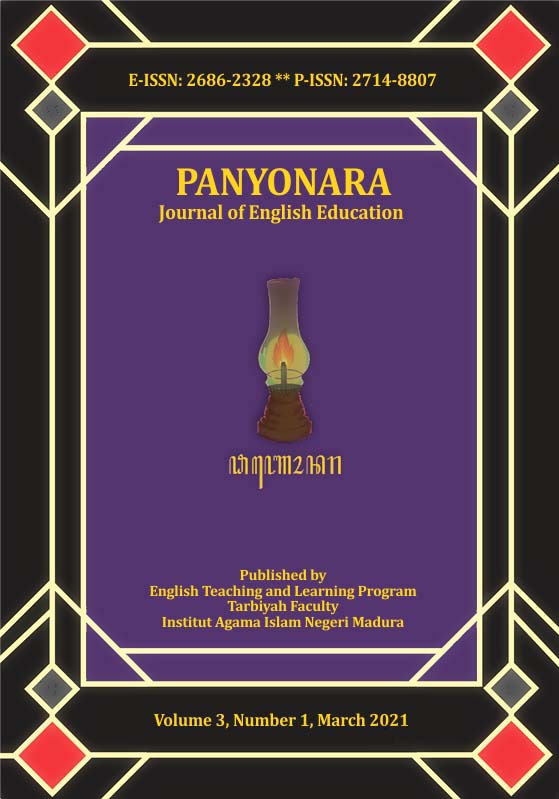Students’ Perceptions Toward Quizizz as an Online Learning Media
 Abstract views: 2650
,
Abstract views: 2650
,
 PDF downloads: 1978
PDF downloads: 1978
Abstract
Indonesia adapted a new change in the education system since Pandemic COVID-19, especially for having online learning. The purpose of this study was to examine students' perceptions toward the use of Quizizz as an online learning media in English courses during the COVID-19 pandemic. The design of the study was descriptive qualitative. The subjects of the study were 89 Information Systems students of STMIK Jayanusa. The data was collected through a questionnaire on Google Forms and they were analyzed by using the Likert Scale. The study revealed that students responded to Quizizz use positively; they strongly agreed about the use of Quizizz in distance learning
Downloads
References
Agung, A. S. S. N., Surtikanti, M. W., & OP, C. A. Q. (2020). Students’ Perception of Online Learning during COVID-19 Pandemic: A Case Study on the English Students of STKIP Pamane Talino. Journal of Social Sciences and Humanities, 10(2). http://ojs.pnb.ac.id/index.php/SOSHUM/article/view/1316
Glasow, P. A. (2005). Glasow, P. A. (2005). Fundamental of Survey Research Methodology. Virginia: MITRE. MITRE.
Hermida, P. A. (2020). College Students’ Use and Acceptance of Emergency Online Learning due to COVID-19. International Journal of Educational Research, 2(3), 26–35.
Morris, B. (2020, May 27). Why Does Zoom Exhausted You? Science Has an Answer. Why Does Zoom Exhausted You? Science Has an Answer. https://wwqw.google.com/amp/s/www.wsj.com/amp/articles/why-does-zoom-exhausted-you-science-has-an-answer-11590600269
Noesgaard, S. S., & Ørngreen, R. (2015). Noesgaard, S. S. & Ǿrngreen, R. (2015). The Effectiveness of E-Learning: An Explorative and Integrative Review of the Definitions, Methodologies and Factors that Promote E-Learning Effectiveness. Electronic Journal of e-Learning, 13(4), 278-290. Electronic Journal of E-Learning, 13(4), 278–290.
Pahamzah, J., Syafrizal, S., Juniardi, Y., & Sukaenah, P. M. (2020). Quizizz as a Students’ Reading Comprehension Learning Media: A Case Study at the Eleventh Grade of Dwi Putra Bangsa Vocational School In Cimanggu. International Journal of English Language and Linguiatics Research, 8(5), 27-33. International Journal of English Language and Linguistics Research, 8(5), 27–33.
Poondej, C., & Lerdpornkulrat, T. (2019). Poondej, C. & Lerdpornkulrat, T. (2019). Gamification in E-Learning: A Moodle Implementation and Its Effect on Students Engagement and Performance. Interactive Technology and Smart Educartion, 17(1). 56-66. Doi: 10.1198?ITSE-06-2019-0030. Interactive Technology and Smart Educartion, 17(1), 56–66. https://doi.org/10.1198?ITSE-06-2019-0030
Priyanti, N. W. I., Santosa, M. H., & Dewi, K. S. (2019). Effect of Quizizz Toward the Eleventh-Grade English Students’ Reading Comprehension in Mobile Learning Context. LEJU, 2(2), 71-80. 2(2), 71–80.
Rahayu, I. S. D., & Purnawarman, P. (2019). The Use of Quizizz in Improving Students’ Grammar Understanding through Self-Assessment. Eleventh Conference on Applied Linguistics (CONAPLIN 2018), 102–106.
Rahmawati, F. (2016). E-learning Implementation: Its Opportunities and Drawbacks Perceived by EFL Students. Journal of Foreign Language, Teaching, and Learning, 1(1), 1-15. Journal of Foreign Language, Teaching, and Learning, 1(1), 1–15.
Riswanto, A., & Aryani, S. (2017). Learning Motivation and Student Achievement: Description Analysis and Relationships both. COUNS-EDU-The International Journal of Counseling and Education, 2(1), 42–47. https://doi.org/0.23916/002017026010
Saxena, R., Kaur, P. P., & Saxena, A. (2020). Role of Information Technology in Education during COVID-19. International Journal of Advance Science and Technology, 29(8), 4071–4078.
Strmečki, D., Bernik, A., & Radošević, D. (2020). Gamification in E-learning: Introducing Gamified Design Elements into E-Learning Systems. Journal of Computer Sciences, 11(120), 108–117. https://doi.org/10.3844/jcssp.2015.1108.1117
Suharsono, A. (2020). The Use of Quizizz and Kahoot! In the Training for Millenial Generation. IJIET, 4(2), 332-342. Doi: 10.24071/ijiet.2020.040215. 4(2), 332–342. https://doi.org/10.24071/ijiet.2020.040215
Tasgin, A., & Tunc, Y. (2018). Effective Participation and Motivation: An Investigation on Secondary School Students. World Journal of Education, 8(1), 58–74.
Vu, P., Crow, S. R., & Fredrickson, S. (2014). Using Games in Online Education: is it A Winning Strategy?. Online Journal of Distance Learning Administration, 17(6), 226-237. Online Journal of Distance Learning Administration, 17(6), 226–237.
Wibawa, R. P., Astuti, R. I., & Pangestu, B. A. (2019). Smartphone-Based Application “Quizizz” as A Learning Media. , 14(2), 244-253. Dinamika Pendidikan, 14(2), 244–253. https://doi.org/10.15294/dp.v14i2.23359
Zhao, F. (2019). Zhao, F. (2019). Using Quizizz to Integrate Fun Multiplayer Activity in the Accounting Classroom. International Journal of Higher Education, 8(1), 37-43. Https://doi.org/10.5430/ijhe.v8n1p37. International Journal of Higher Education, 8(1), 37–43.
The journal uses an Open Access policy under a Creative Commons Attribution-NonCommercial 4.0 International License. Authors who publish with this journal agree to the following terms:
- Authors retain copyright and grant the journal right of first publication with the work simultaneously licensed under a Creative Commons Attribution License that allows others to share the work with an acknowledgment of the work's authorship and initial publication in this journal.
- Authors are able to enter into separate, additional contractual arrangements for the non-exclusive distribution of the journal's published version of the work (e.g., post it to an institutional repository or publish it in a book), with an acknowledgment of its initial publication in this journal.
- Authors are permitted and encouraged to post their work online (e.g., in institutional repositories or on their website) prior to and during the submission process, as it can lead to productive exchanges, as well as earlier and greater citation of published work.
















